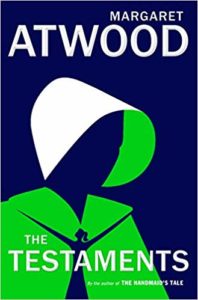 Title: The Testaments (The Handmaid’s Tale #2)
Title: The Testaments (The Handmaid’s Tale #2)
Author: Margaret Atwood
Publisher: Nan A. Talese
Publication Date: 2019
Genres: Speculative Fiction, Dystopia
Length: 432 pages
Source: I bought it.
Rating: 4.5 Stars
Blurb: More than fifteen years after the events of The Handmaid’s Tale, the theocratic regime of the Republic of Gilead maintains its grip on power, but there are signs it is beginning to rot from within. At this crucial moment, the lives of three radically different women converge, with potentially explosive results.
Two have grown up as part of the first generation to come of age in the new order. The testimonies of these two young women are joined by a third voice: a woman who wields power through the ruthless accumulation and deployment of secrets.
As Atwood unfolds The Testaments, she opens up the innermost workings of Gilead as each woman is forced to come to terms with who she is, and how far she will go for what she believes.
Review:
Content warning: sexual assault, child abuse, torture, pregnancy, childbirth, and murder. I will only make a few vague reference to these things in my review. This will otherwise be a spoiler-free post.
Be sure to finish The Handmaid’s Tale before picking up The Testaments. I’d also recommend either watching the TV show based on this universe or doing a few hours of research on the characters, themes, and plot twists featured in the small screen version of it as well.
This is something best read by people who are intimately familiar with what has already happened in this tale, and I will be assuming that everyone who continues reading is already familiar with this universe.
I’ve included non-spoiler-y quotes from this book at key points in this review.
“You don’t believe the sky is falling until a chunk of it falls on you.”
Now that those things have been addressed, let’s jump straight into my review. I’m writing this as a hardcore fan whose expectations were sky high and who had been hotly anticipating this book. The only thing I knew going into it was that it was set long after the final scene in The Handmaid’s Tale and that it had three female narrators.
Aunt Lydia was originally introduced in the first book in this series. Her role in Gilead was to help keep the female sphere of that society running smoothly, especially when it came to training and disciplining the Handmaids. Witness 369A was a young girl who grew up in Gilead as the cherished only child of a wealthy commander and his wife. She was a true believer in her childhood faith. Finally, Daisy was a young woman who lived in Canada.
“You’d be surprised how quickly the mind goes soggy in the absence of other people. One person alone is not a full person: we exist in relation to others. I was one person: I risked becoming no person.”
My descriptions of the narrators may sound incomplete. They were written that way to purposefully avoid sharing spoilers, so be careful about what you read elsewhere online if you google them.
Gilead was a violent, abusive society wrapped in the shroud of (mostly) false piety. The Testaments went into more detail about how women were treated in many different layers of society than the novel version of the first book in this series did. Having three narrators from such different backgrounds made it easy for Ms. Atwood to explore parts of this universe that Offred couldn’t have known a thing about when she originally shared her tale.
What I found most interesting about it was how different groups of women were pitted against each other and divided into small groups: fertile women, fertile women who gave birth to living, healthy children, wives of lower-ranking Commanders, wives of higher-ranking Commanders, adoptive mothers, Marthas, Econowives, Handmaids, Aunts, and more.
“It was also shameful: when a shameful thing is done to you, the shamefulness rubs off on you. You feel dirtied.”
Everyone was competing for the same vanishingly small piece of status despite the fact that there was no safe position to take. Danger lurked everywhere no matter who you were or what you did because Gilead blamed women for things they had no control over and never wanted in the first place.
Yes, this could also be interpreted as a criticism of the way women are treated in modern society. Just like The Handmaid’s Tale, the sequel is firmly inspired by and a critique of real-world events. Dystopian novels work best for me when they draw parallels between what is happening in them and what the author wants his or her readers to understand about the real world. This is something Ms. Atwood has always excelled at, and I nodded in agreement when I read the sentences that gave hints about her opinions of the current political climate in Canada, the United States, and elsewhere. They were brief and never interfered with the plot itself, but they made her position on the rights of women, LGBT+ people, and minorities unmistakeable.
The one thing I wish had been a little better explained in this story has to do with Aunt Lydia’s character development. She’s an easy character to loathe in the book and television versions of The Handmaid’s Tale. I was fascinated by the descriptions of her life before and during the rise of Gilead. There were times when I sympathized with her despite all of the horrible things she did later on in life.
“As they say, history does not repeat itself, but it rhymes.”
Finally, what surprised me the most about this book were the conclusions it made about what to do if you find yourself locked into a world that seems impossible to escape.
The Handmaid’s Tale took a fairly passive approach to this dilemma. Any shred of hope that took root there would quickly be covered up before it was trampled.
The Testaments waters that hope, fertilizes the soil, and encourages the sun to shine just enough so that hope pushes its roots into the centre of the earth and flourishes.
Yes, history sometimes rhymes. No, that doesn’t mean that we’re powerless to change how the next sentence ends.
If for no other reason, this breath of fresh air is reason enough to read it.
 Title: Tucker Vs. The Apocalypse
Title: Tucker Vs. The Apocalypse
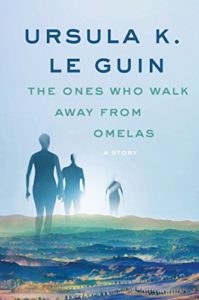 Title: The Ones Who Walk Away From Omelas
Title: The Ones Who Walk Away From Omelas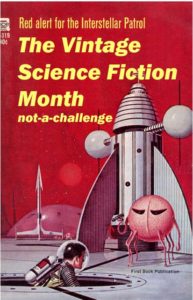
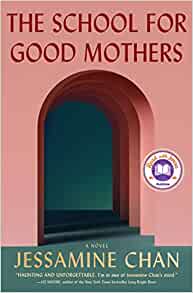 Title: The School for Good Mothers
Title: The School for Good Mothers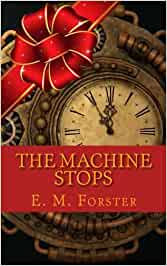 Who needs in-person contact when you have virtual gatherings?
Who needs in-person contact when you have virtual gatherings? Title: The Testaments (The Handmaid’s Tale #2)
Title: The Testaments (The Handmaid’s Tale #2)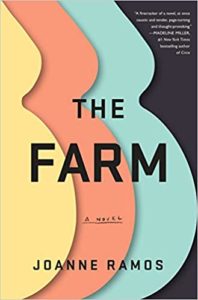 Title: The Farm
Title: The Farm I don’t know about you, but I’m getting pretty tired of the bleak, dystopian themes in a lot of modern science fiction.
I don’t know about you, but I’m getting pretty tired of the bleak, dystopian themes in a lot of modern science fiction. You might have noticed that I haven’t listed any specific titles yet here.
You might have noticed that I haven’t listed any specific titles yet here.